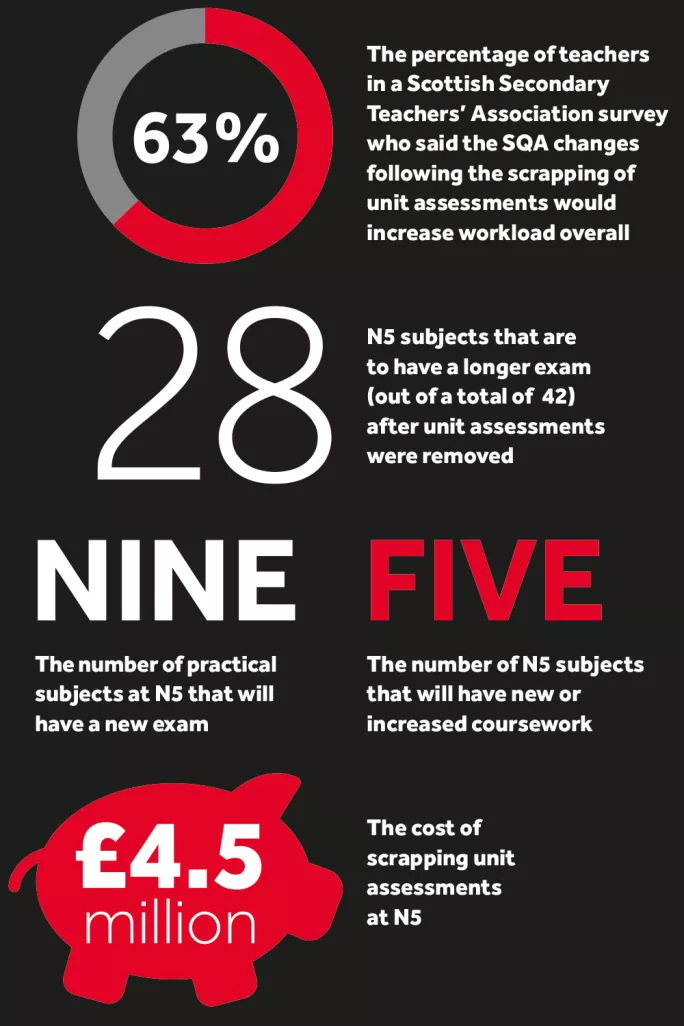More exam changes may be in pipeline, SQA warns

Teachers have been warned by the head of Scotland’s exam body that more change could be in the pipeline when it comes to the new national qualifications.
Scottish Qualifications Authority (SQA) chief executive Janet Brown told the Scottish Parliament’s education and skills committee that if “significant numbers of schools” are found to be delivering bi-level classes, compatibility between N4 and N5 will have to be looked at - and that will mean “change again”.
Closing the gap
Research published this month by the SQA suggested bi-level teaching was widespread in Scottish schools; S4 pupils in every school the SQA visited - including at least one from every local authority - reported that some classes were taught as bi-level. In a few cases, classes were taught as tri-level groups, the pupils said.
Teachers, meanwhile, report that discontinuity between N4 and N5 courses - particularly in the sciences - is making bi-level teaching difficult and adding to their workload.
The SQA already stands accused of excessive changes to qualifications owing to the revisions that have been made to coursework and examinations at N5, in order to compensate for the removal of unit assessments, announced by education secretary John Swinney last year.

Dr Brown told the committee last week: “If we are seeing significant numbers of schools delivering in multi-level teaching then I think we do have to start looking at some of the content.
“The challenge is, as soon as we start looking at the content, we would have to change again. We would have to change the content of either N4 or N5 to be able to have that blended learning taking place.”
Dr Brown made her comments under questioning from Labour MSP Daniel Johnson, who said that concerns around N4 were not just about “assessment” but also “deliverability” - especially when it came to teachers who were having to deliver N4 and N5 in one class.
He cited the example of a physics teacher who had told him that waves feature in the N4 and N5 syllabuses, but at N4 the focus was on sound waves and at N5 it was on electromagnetic spectrum - which were “just not compatible”.
When he asked if that compatibility was something the SQA was seeking to resolve, Dr Brown told him that teachers could face more change.
According to Jim Thewliss, general secretary of secondary headteachers’ body School Leaders Scotland, discontinuity between N4 and N5 courses has been an issue since the new qualifications were introduced.
He said: “There are two choices: address it by making changes to courses or increase teacher numbers so that schools can deliver the qualifications separately.”
He warned that whatever was decided, pupils should not be disadvantaged.
Scotland’s largest teaching union, the Educational Institute of Scotland (EIS), suggested that, as the new qualifications bedded-in, changes to the senior phase could result in bi-level teaching becoming less common.
More preparation time
In the meantime, EIS assistant secretary Andrea Bradley said that teachers delivering bi-level classes should be given smaller class sizes and more preparation time.
“These timetabling configurations are quite common now and place significant stress on teachers because they are doing two sets of preparation, marking and assessment for relatively large groups of children in the same class. Under these circumstances we would advise our members to seek concessions.”
You need a Tes subscription to read this article
Subscribe now to read this article and get other subscriber-only content:
- Unlimited access to all Tes magazine content
- Exclusive subscriber-only stories
- Award-winning email newsletters
Already a subscriber? Log in
You need a subscription to read this article
Subscribe now to read this article and get other subscriber-only content, including:
- Unlimited access to all Tes magazine content
- Exclusive subscriber-only stories
- Award-winning email newsletters